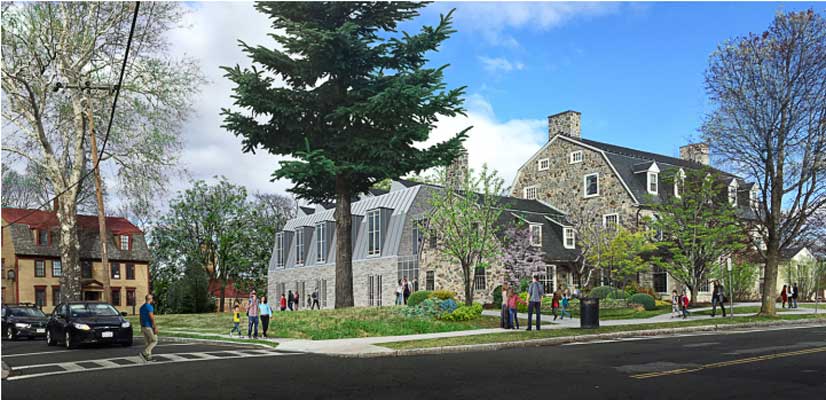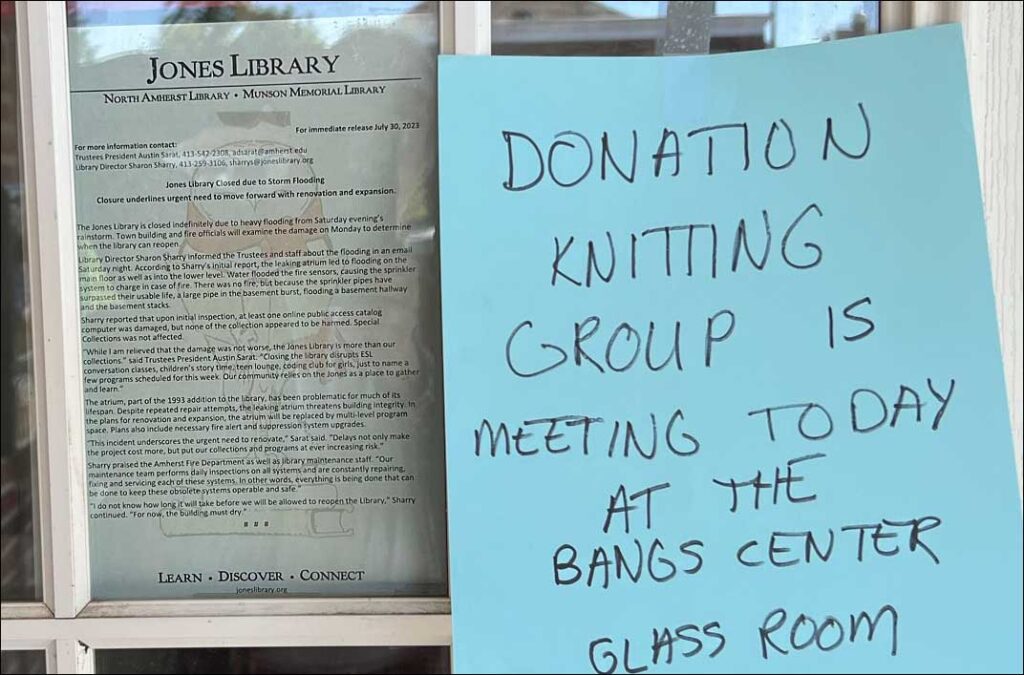Deferred Maintenance Strikes Again As Leaks Force Jones Library Closure

Photo: https://www.joneslibrary.org/
Records Show No Planned Investment In Library Upkeep Since 2014
On Monday, July 31, visitors to the Jones Library were met with a closed building and a notice explaining that weekend rains had resulted in a leak in the building’s glass atrium roof which triggered fire sensors. This caused sprinklers which “had surpassed their usable life” to burst. The atrium, described as being “problematic for much of its lifespan” was blamed. Carpets were drenched and a library computer was reportedly damaged. The building re-opened on Wednesday, with carpets appearing dry, though a floor fan was running beneath the area of the joint where the atrium roof meets the adjoining fiction room. Several ceiling tiles above the fan were warped and discolored from water damage.
Board of Trustees President Austin Sarat declared, “The incident underscores the urgent need to renovate.”

Homeowners who have experienced roof leaks may wonder how undertaking a $46.1 million demolition-renovation-expansion of the building can be viewed as the solution to a faulty roof seam. A review of the library project’s decade-long history may be helpful.
See related Opinion: Library Leaks Are Evidence Of Longterm Neglect And Failure Of Management
A Brief History Of The Jones Library Building Project
Shortly after Library Director Sharon Sharry was hired in Fall 2011, she confided in a former trustee about her vision for the building. Standing in the Reference Section on the main floor she gestured through the window toward the Kinsey Garden in the rear of the property. “I’d like to build out there,” Sharry announced. The trustee described being taken aback.
In 2012, a representative of the Massachusetts Board of Library Commissioners (MBLC) reportedly, and apparently without the benefit of patron feedback, judged the Jones as “one of the most dysfunctional libraries in the Commonwealth.” This statement energized library leaders over the possibility of winning funds from an MBLC Construction Grant Program to be kicked off in 2016.
By 2014 a Feasibility Committee was formed to develop an MBLC grant proposal. Its members included Trustee President and Amherst College professor Sarat, fundraiser and former Amherst College Chief Development Officer Kent Faerber, Sharry and ten other trustees, staff members and library supporters.
The group set out to develop a FY17-FY21 Long Range Plan that could be presented to justify an ambitious renovation and expansion. One of the plan’s conclusions was “Funding from the Town of Amherst and other sources of funding must adjust to developing service needs and future growth.”
The plan also identified as an immediate priority to “complete a Building Program and secure necessary funding for expansion/renovations.”
Matt Blumenfeld, a fundraising consultant hired by the library, predicted at the first Feasibility Committee meeting in November 2014 that renovation/expansion would be a complex project. He estimated that it “will come to fruition by 2020.”
Meeting minutes quote Sarat as saying, “We have a problem because many people say, ‘What’s wrong with the library?’ Also, as a requirement of the grant proposal, we need to consider alternative sites. It was not well received at Town Meeting. We won’t talk about it, but parking is a big problem.”
Vigorous promotion by the fundraisers and library leadership’s frequent communications to patrons enabled the renovation/expansion idea to gather momentum.
The library used a $50,000 MBLC Planning and Design Grant and another $25,000 from the Town to hire Finegold Alexander Architects to develop design schematics for a renovated and expanded library. The plan which was unveiled in 2016 called for the demolition and rebuilding of a 15,000 sq. ft. addition to the Library constructed in 1993 and a new 15,000 sq. ft. wing added to the rear of the historic building atop the Kinsey Garden.
The library submitted a grant proposal to the MBLC, claiming a current service population of 51,000. Amherst’s population at the time was 37,819.
To library leaders’ delight, the MBLC gave the Jones Library $13.8 million, the largest of 33 construction grants awarded to Massachusetts libraries in the 2016-17 grant round. The bad news was that the Town of Amherst would need to come up with $15.8 million plus $9 million in borrowing costs (plus a $1 million CPA grant) to fully fund the then estimated $36.3 million project — one of the largest commitments of municipal funds in state library grant program history.
This huge town commitment to funding improvements to the privately owned Jones Library Inc. building represented a dramatic shift in Amherst fiscal policy. The town had steadfastly refused to contribute more than $1 million toward building the 1993 addition that is now slated for demolition. That project cost a total of $5 million, with $2.6 million being covered by an MBLC grant, and $1 million paid by the Library.
On selling the new funding plan to taxpayers, Sarat spoke of the need to “remind people of the compelling case already made.”
The Daily Hampshire Gazette reported that Louis Mainzer of the Friends of the Jones Library advised trustees that “the challenge is to get buy-in from library users who love the feel of the 1928 building and the early 1990s expansion.”
“The conundrum is a lot of residents think it’s perfect the way it is,” he said,
This Is What Deferred Maintenance Looks Like
Anticipating that the grant-funded library renovation/expansion would replace aging systems such as the building’s HVAC system and roof, the Town and Library stopped including Jones Library maintenance expenses in their annual Joint Capital Plan. Financial reports show that the last significant investment of funds into library building maintenance that was approved by the Finance Committee was $25,000 for roof repairs and $30,000 for a fire system upgrade in Fiscal Year 2014. FY2014 covers July 2013 through June 2014.
The FY2014 Library Annual Report explained, “To maximize fiscal responsibility and leverage, we are deferring work which might be impacted by renovations until plans are firm and we know whether a state contribution is available.”
Amherst and Library leaders were not prepared for the possibility that the affordability of the renovation-expansion would still be in question heading into 2024. With the project currently facing a roughly $10 million budget gap, design and project management fees continuing to accrue, final costs not to be confirmed until construction bids are received next February, and Town Council approval required to increase the project’s borrowing authorization, Town and Library leaders appear content to roll the dice. They hope that the Jones Library’s aging building systems will hold up safely until the fate of the multi-million-dollar building project is determined.
See related Deferred Maintenance Catches Up With Jones Library As Boiler Catches Fire
